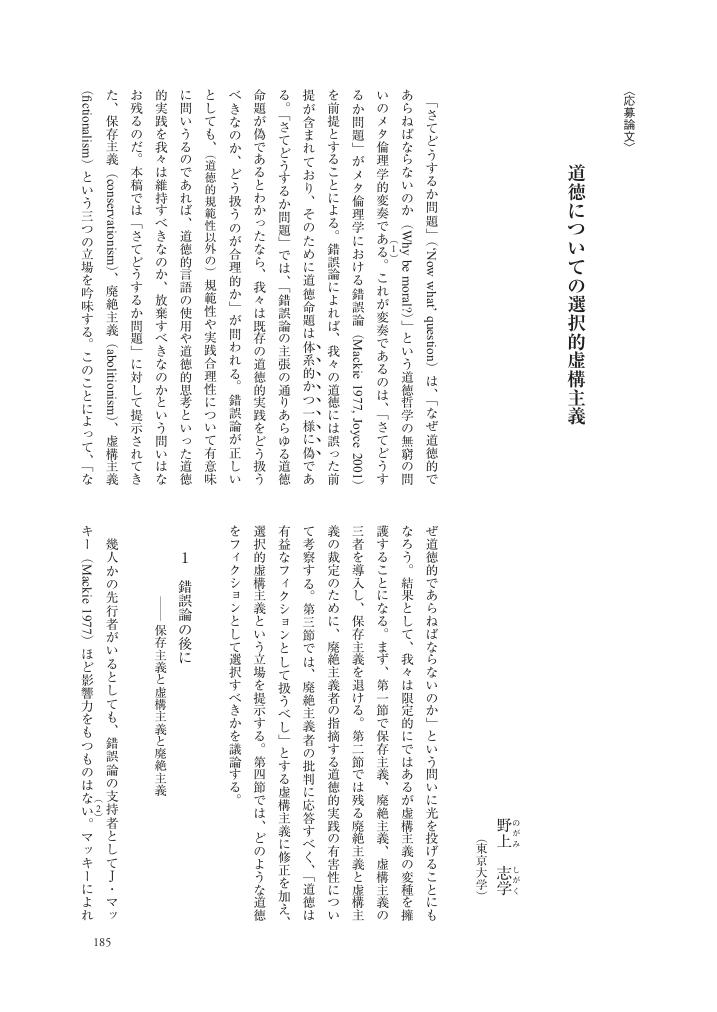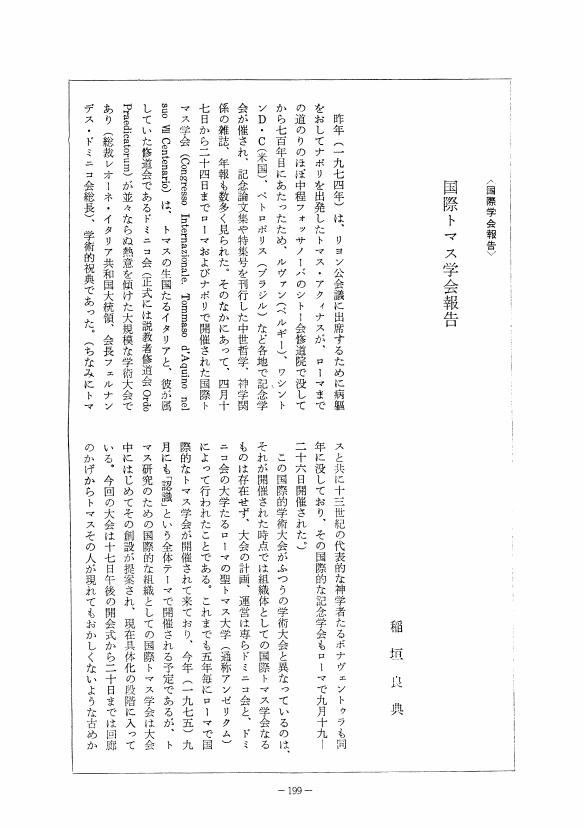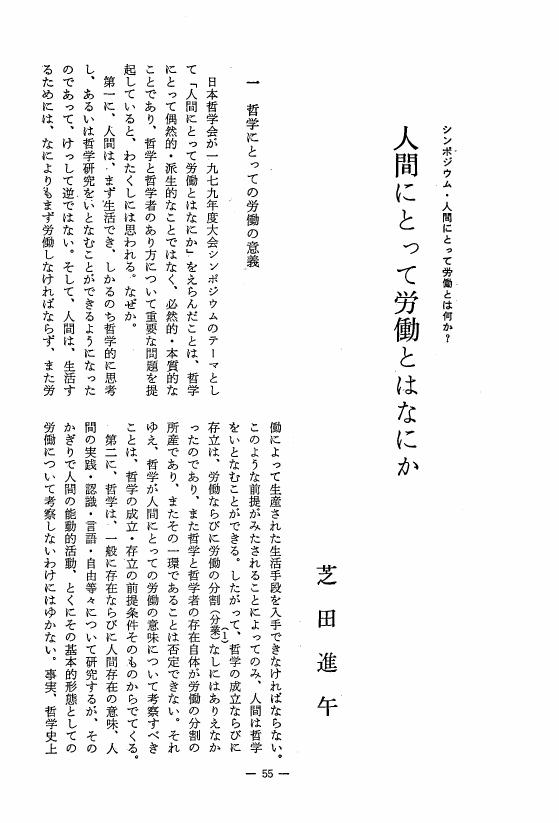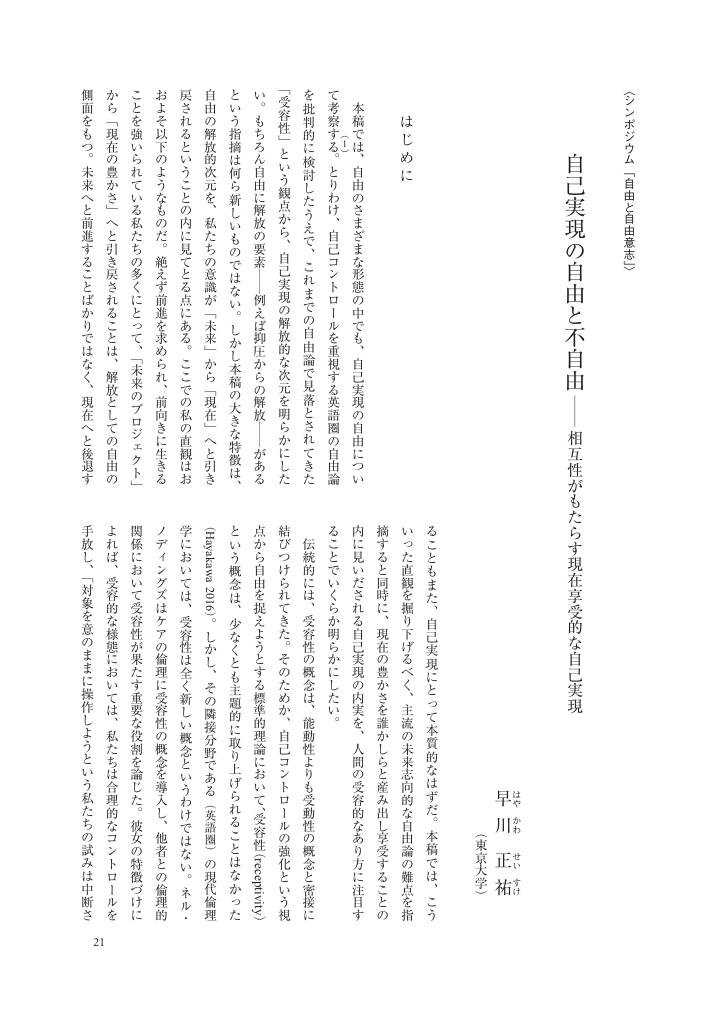5 0 0 0 OA ライプニッツの機械論
- 著者
- 佐々木 能章
- 出版者
- 日本哲学会
- 雑誌
- 哲学 (ISSN:03873358)
- 巻号頁・発行日
- vol.1985, no.35, pp.119-129, 1985-05-01 (Released:2009-07-23)
5 0 0 0 OA 道徳についての選択的虚構主義
- 著者
- 野上 志学
- 出版者
- 日本哲学会
- 雑誌
- 哲学 (ISSN:03873358)
- 巻号頁・発行日
- vol.2020, no.71, pp.185-196, 2020-04-01 (Released:2020-05-12)
- 参考文献数
- 17
5 0 0 0 OA カントにおけるカテゴリーの「超越論的事実性」
- 著者
- 川谷 茂樹
- 出版者
- 日本哲学会
- 雑誌
- 哲学 (ISSN:03873358)
- 巻号頁・発行日
- vol.2004, no.55, pp.155-166,27, 2004-04-01 (Released:2009-07-23)
Was fur eine Tätigkeit ist es, die Formen in der Philosophie zu erforschen? Welche Eigentümlichkeit haben die Formen, die durch eine solche Erforschungen entdeckt werden? Was fur eine Tätigkeit ist die transzendentale Philosophie über-haupt?In diesem Aufsatz versuche ich eine adäquate Antwort auf die diese Fragen zu geben, indem ich Kants Argumente in seinen metaphysisch und transzendental genannten zwei "Deduktionen der Kategorien" interpretiere.In der metaphysischen Deduktion kann Kant das Programm seiner Argumentation eigentlich nicht ausfuhren, ohne abhängig von der blossen Tatsache zu sein, dass wir stets durch die zwölf Urteilsformen (Kategorien) urteilen (denken). Fol-glich wird unseren Kategorien ein Merkmal des Faktizität zugefügt. Auch kann die transzendentale Deduktion eine "Alternativenlosigkeit" nicht beweisen. Aber mit diesen Dedktionen können wir argumentieren, dass unsere Kategorien transzendental sind.Letztlich kann man sagen, dass die transzendentale Faktizität unserer Kategorien in Kants zwei "Deduktionen der Kategorien" eine ultimative Grenze erreicht hat. Aber der problematische Begriff dieser Faktizität deutet auf die "unmögliche Moglichkeit" (Th. M. Seebohm) hin, dass unsere Kategorien, die als transzendentale Formen festgestellt werden, entstehen, sich verändern und auch verschwinden können.Die transzendentale Philosophie ist (1) die Tätigkeit, die den ursprünglichen Widerspruch aufweist, die transzendentale Formen, die die Fakta möglich machen, als das Faktum zu setzen, (2) die Bewegung, die schon vom Widerspruch (Aporie) als einem negativen Ursprung ausgeht.
- 著者
- 佐藤 典子
- 出版者
- 三田哲學會
- 雑誌
- 哲学 (ISSN:05632099)
- 巻号頁・発行日
- vol.112, pp.1-31, 2004-03
序I. フランスの家族に関する法と歴史的背景 1. 家族の現状 (1) フランスの婚姻事情 (2) 内縁=事実婚の傾向 (1) 内縁の実態 (2) 従来の内縁関係の問題 ア) 異性愛内縁カップル イ) 同性愛内縁カップル ウ) 内縁に対する法解釈と判例 (3) 親子関係の変化 2. 家族法の歴史 (1) 近代家族の誕生 (2) 家族の権威原則の消失 : 失墜した家父長制 (3) 複合家族の出現II. Pacsとは 1. パクス制定 (1) パクス前史 (2) パクス制定までの経過 2. パクス法とは (1) 法的な定義 (2) 法的なあいまいさ (3) 「内縁」の規定 (4) パクスの定着 3. パクスの法的な評価 (1) 内縁関係を立法化する必要があるのか (2) カップルが子を持つことの可能性 4. 社会的な意義の検証 (1) 同性愛カップルについて (1) 同性愛者個人に対する差別 (2) 同性愛カップルに対するまなざし (3) 同性愛カップルは家族か (2)異性愛カップルとパクス (3) 偽装パクス (4) 「友情以上結婚未満」カップルのケースIII. 象徴闘争としてのパクス 1. 親密関係の再政治化 (1) 「個人的なことは政治的なこと」であるか (2) 家族制度と「連帯(Solidarité)」 (3) 同性愛カップルにとってのパクス (4) 対幻想としてのパクス 2. パクスの象徴闘争としての側面 (1) パクスは脱構築されているか (2) 自己決定という名の陥穽 (3) 象徴的支配としてのパクス特集家族とその社会的生活世界の探求論文
5 0 0 0 OA ウィリアム・ジェイムズのプラグマティズムにおける実在とその認識
- 著者
- 山根 秀介
- 出版者
- 日本哲学会
- 雑誌
- 哲学 (ISSN:03873358)
- 巻号頁・発行日
- vol.2017, no.68, pp.215-230, 2017-04-01 (Released:2017-06-14)
- 参考文献数
- 3
William James’s pragmatism has been criticized since it was first proposed. In particular, his claim that whether an idea is true or not must depend on the effect which it has on our experiences invites the criticism that pragmatism is a form of subjectivism and anti-realism. According to this criticism, if any idea considered as useful is true, the criteria of truth set by pragmatism depend on the time and situation, and so are only arbitrary and relative; therefore, a true idea is a figment of some human imagination which has no connection with objective reality.However, James repeatedly objected to this criticism. He claimed that his pragmatism did not make truth vague and uncertain, that one could certainly get access to reality by true ideas and that in this sense he was a realist. The purpose of this study is to show, by analyzing the theory of truth in James’s pragmatism, that he understood the agreement of our ideas with reality in a different way from other theories, and constructed a characteristic realism of his own.In James’s view, truth as the agreement of an idea with reality is realized by certain actions that the idea leads to, namely, by a process of verification that one can practically follow, and reality is a mixture of sense experiences and previous truths one has already acquired. This study considers an action performed to know reality as a kind of intuition, and explains that the truth established by the action transforms reality. Reality as inevitable not only presses one to be subject to it: one can also act on and change it. James insists that an action as intuition embodies our knowledge of reality, and also contributes to the creation of reality in the sense that it newly produces truths and adds them to reality. For James, this interaction between human beings and reality, and the constant modifications occasioned by it are the actuality of our concrete world.
5 0 0 0 OA 政治に対する哲学する者たちの応答可能性
- 著者
- 森 一郎
- 出版者
- 日本哲学会
- 雑誌
- 哲学 (ISSN:03873358)
- 巻号頁・発行日
- vol.2016, no.67, pp.42-58, 2016-04-01 (Released:2017-06-13)
- 参考文献数
- 1
„Die politische Verantwortung eines Philosophen“ – das ist eine heikle Frage. In meiner Thematik versuche ich das Problem am Beispiel Heideggers zu erläutern, um darüber nachzudenken, inwiefern wir Philosophierenden dem Politischen entsprechend handeln können.Neuerdings hat eine heftige Diskussion über die „Schwarze Hefte“ stattgefunden, in denen Heidegger im Geheimen eine Anzahl von „antisemitischen“ Bemerkungen hinterlassen hatte. Wenn man, anstatt dieser Diskussion nachzugehen, seine Aufmerksamkeit den direkt nach dem zweiten Weltkrieg geschriebenen Heften zuwendet, sieht man, dass der Philosoph dort immer wieder über seinen „Irrtum 1933“ reflektierte. Sein akademisch-politisches Unternehmen und Scheitern als Rektor der Universität Freiburg bleiben noch heute aufschlußreich.Es gibt aber auch einige zu unterscheidende Aspekte, wenn von der „politischen Verantwortung der Wissenschaftler“ die Rede ist: erstens als Staatsbürger im Allgemeinen, zweitens als Mitglieder wissenschaftlicher Organisationen und drittens als Forscher, deren Zusammenarbeit eine große politische Wirkung entfalten kann. Seit der Explosionen der Atombomben 1945 ist vor allem die dritte sogenannte gesellschaftliche Verantwortung der Wissenschaftler maßgeblich geworden.Dementsprechend lassen sich die Aspekte der politischen Verantwortung eines Philosophierenden unterscheiden: erstens als Staatsbürger, wobei noch weiter die Rolle irgendeines Philosophen-Königs und die irgendeines theoretischen Beraters zu unterscheiden sind, zweitens als Führer einer Gelehrtenrepublik und drittens als freier kritischer Betrachter menschlicher Angelegenheiten und radikaler Theoretiker politischer Philosophie. Als freier Geist ent-spricht er seinem eigenen Zeitalter – für uns nämlich: dem Atomzeitalter.
5 0 0 0 『純粋理性批判』における第四誤謬推論の意義
- 著者
- 牧野 英二
- 出版者
- The Philosophical Association of Japan
- 雑誌
- 哲学 (ISSN:03873358)
- 巻号頁・発行日
- no.30, pp.134-146, 1980
5 0 0 0 OA 見ていることを感覚する
- 著者
- 中畑 正志
- 出版者
- 日本哲学会
- 雑誌
- 哲学 (ISSN:03873358)
- 巻号頁・発行日
- vol.2013, no.64, pp.78-102_L8, 2013 (Released:2014-07-10)
- 参考文献数
- 44
The phenomenon described as “perceiving that one sees” or “perception of one's own perception” has attracted the attention of many philosophers. In this article, I articulate the differences between Aristotle's and Descartes' understanding of this phenomenon, with brief comments on the discussion of the same phenomenon in the Cyrenaics, Stoics and Plotinus.In several passages Aristotle explores this phenomenon, i. e. “perceiving that one sees.” We should pay special attention to the fact that in De somno, Aristotle assumes that trans-modal discrimination (such as discrimination of sweet from white) implies this sort of higher order perception. We can explain this implication as follows: when we discriminate, for example, sweet from white, we also discriminate the respective modes of perception, namely, tasting in the perception of sweet on the one hand and seeing in the perception of white on the other. This means that Aristotle understands perceiving that one sees as an integral part of the first order perception of the external thing. This is why this second order recognition is a kind of sense-perception par excellence for Aristotle.Descartes elucidates the phenomenon of perceiving that one sees in an opposite way from Aristotle. He separates this phenomenon from the external object that one perceives. Descartes restricts the sense-perception within one’s subjective experience and counts it as a mode of thought. This is sense-perception in its proper (praecise) sense for Descartes and what he calls conscientia (consciousness). Descartes broke the Aristotelian unity between our inner activity and its external objects, and the Cartesian concept of consciousness is a historical product of this break. By examining the explanations of the same phenomenon expounded by the Cyrenaics, Stoics and Plotinus, we can confirm its historicity.
5 0 0 0 OA 単独的なものの様相
- 著者
- 檜垣 立哉
- 出版者
- 日本哲学会
- 雑誌
- 哲学 (ISSN:03873358)
- 巻号頁・発行日
- vol.2012, no.63, pp.115-130_L7, 2012 (Released:2012-10-16)
- 参考文献数
- 11
Lorsque l'on réfléchit à l'individualité, on pense notamment à la singularité, et ce qui importe alors est la répétition de ce qui a été autrefois et l'aspect unique de cela même. Pour concevoir le concept de singularité, Deleuze le distingue de celui de particularité, qui est toujours une répétition basée sur une loi ou un principe universel. Mais la singularité, en tant que répétition dans le temps métaphysique de ce qui est infiniment répét> é, est la répétition porteuse d'une existence comme une chose ellemême unique. Pour indiquer ces éléments, Deleuze parle d'un temps qui s'appuie sur l'éternel retour et 'un coup de dés' de Mallarmé. Je rejoins ici la discussion par Kuki Shuzô de la contingence, en particulier par le biais de l'événementialité et de l'éternel retour. Il s'agit là d'un problème métaphysique, mais l'individu de l'évolution dans la biologie actuelle, ou dans la société du risque, renvoie encore au problème de la responsabilité du fait qu'il ne peut être pensé que statistiquement.
5 0 0 0 IR エクリチュ-ルの比喩
- 著者
- 永井 均
- 出版者
- 三田哲學會
- 雑誌
- 哲学 (ISSN:05632099)
- 巻号頁・発行日
- no.66, pp.p27-54, 1977-09
L'intention de la presente etude est double : renvoyer la discussion sur la metaphore a son origine : l'ecriture; et ramener les interpretations de l'ecriture a son origine : la metaphore. C'est par cette voie que nous aurons la possibilite a la fois d'eclaircir la signification de la metaphore et d'expliquer le concept de l'ecritnre. C'est la d'ailleurs que sera montree l'invalidite des analyses structurales et phenomenologiques de la metaphore. Nous commencerons par mettre en question la theorie structuraliste de la metaphore : celle de Roman Jakobson. Nous examinerons dans la suit la critique du structuralisme par Paul Ricoeur afin d'elaborer notre conception de decalage. Nous etudierons enfin l'analyse de Max Black pour reconstituer sa theorie d'interaction de la metaphore. Les resultats de ces examens nous permettront de mettre en lumiere la metaphore de l'ecriture chez Jacques Derrida. Cet eclaircissement ouvrira sans doute pour la premiere fois la discussion fructueuse sur la metaphore. Parce que la metaphore de l'ecriture est fondee sur l'ecriture de la metaphore.
5 0 0 0 OA 国際トマス学会報告
- 著者
- 稲垣 良典
- 出版者
- 日本哲学会
- 雑誌
- 哲学 (ISSN:03873358)
- 巻号頁・発行日
- vol.1975, no.25, pp.199-206, 1975-05-01 (Released:2009-07-23)
- 著者
- 三浦 直子
- 出版者
- 三田哲學會
- 雑誌
- 哲学 (ISSN:05632099)
- 巻号頁・発行日
- vol.125, pp.235-262, 2011-03
特集 : 人間科学投稿論文It is important that the experience of quantitative researches influenced Bourdieu's sociology. In this paper, I examine Bourdieu's practice and theory of cultural sociology in the 1960s and find out two phases of the influence of quantitative researches. First, he located the statistical data (results of quantitative analyses) as the methods of controlling his practice in researches, so as to reflect it in epistemology. Therefore, by introducing the statistical approach, he aimed at objective research practice, excluding researcher's spontaneous conviction and common sense. Secondarily, by introducing it, he constructed original concepts and formed his unique sociological theory. Especially, his concept of "habitus" enabled to mediate subjective experiences and objective regularities, by involving the dualism of the statistical probability (the gap between the subjective probability and the objective probability).
4 0 0 0 OA フーコーにおけるテクノロジーと倫理 : セクシュアリティの概念をめぐって
- 著者
- 杉山 吉弘
- 出版者
- 北海道大学哲学会
- 雑誌
- 哲学 (ISSN:02872560)
- 巻号頁・発行日
- vol.40, pp.65-80, 2004-07-18
4 0 0 0 OA ヘーゲルの偶然論
- 著者
- 本田 修郎
- 出版者
- 日本哲学会
- 雑誌
- 哲学 (ISSN:03873358)
- 巻号頁・発行日
- vol.1957, no.7, pp.32-38, 1957-03-31 (Released:2009-07-23)
- 参考文献数
- 31
ヘーゲルによれば、現実的なものはまた理性的である.現実のの理性的認識は、これを概念の必然性から理解することにほかならない、レーニンもその「哲学ノート」で、特にヘーゲルの次の言葉を重要視しているほどである.「現実の諸契機の総体、それが、展開するときは自己を必然性としてあらわす」そして、レーニンはここで、「注意せよ=弁証法的認識の本質だ」と、つけ加えている.もちろんその意味するところは異ってきているが、ヘーゲルもレーニンも、現実の展開の必然性を基本的なものとみた点は同じである。このような圧倒的な必然性の意義に対して、現実の外的な偶然性の面は、果してどれだけの重みを保ちうるであろうか.現在の非合理主義的な哲学や、現代の物理学、生物学に基ずく科学論やでは、偶然性の概念は依然重要な意味を持たされている.こういう際にヘーゲの弁証法が、偶然性の契機をどういう風にその必然論に統一したかを顧みることは、意義あるものと思われる.ここでは主としてヘーゲルの論理学に依りながら、考察を進めるが、その際便宜上から、九鬼周造氏の偶然論を対照してゆくことにした.
4 0 0 0 OA ブロッホにおける「新しきもの」の客観化
- 著者
- 小田 智敏
- 出版者
- 日本哲学会
- 雑誌
- 哲学 (ISSN:03873358)
- 巻号頁・発行日
- vol.2000, no.51, pp.230-239, 2000-05-01 (Released:2010-01-20)
エルンスト・ブロッホは、しばしば自著のなかで過去の著作からの引用を行なうが、その自己引用はギムナジウム在学中の少年時代の草稿にまで及ぶ。これは、ブロッホが自らの哲学の全体を、青年期に胚胎した思想の一貫した展開・成就と理解している証といえるだろう。この論文で私は、ブロッホの成熟期の著作を参照しつつ、彼の最初期の草稿や著作を検討することによって彼の思想の初発の動機を見定め、ブロッホ哲学の基本的骨格を明らかにしたい。
4 0 0 0 OA 人工知能と現代哲学 ハイデガー・ヨーナス・粘菌
- 著者
- 森岡 正博
- 出版者
- 日本哲学会
- 雑誌
- 哲学 (ISSN:03873358)
- 巻号頁・発行日
- vol.2019, no.70, pp.51-68, 2019-04-01 (Released:2019-04-18)
- 参考文献数
- 15
The frame problem has considered to be one of the most difficult philosophical problems for artificial intelligence to overcome. In this paper, two recent arguments on this topic are discussed. The one is “Heideggerian AI,” which was proposed by the philosopher Hubert Dreyfus, and the other is “Metabolic AI,” which was argued by Tom Froese and Tom Zimke, inspired by Hans Jonas’s philosophy of biology. And finally, the true slime mold computer made by Toshiyuki Nakagaki and Ryo Kobayashi is discussed from the perspective of philosophy of artificial intelligence. I conclude that a future bio-computer system that will be made up of bacteria whose cells are enhanced by artificial nano-computers might solve the frame problem at its fundamental level.
4 0 0 0 OA 人間にとって労働とはなにか
- 著者
- 芝田 進午
- 出版者
- 日本哲学会
- 雑誌
- 哲学 (ISSN:03873358)
- 巻号頁・発行日
- vol.1979, no.29, pp.55-64, 1979-05-01 (Released:2009-07-23)
- 著者
- 鈴木 正崇
- 出版者
- 三田哲學會
- 雑誌
- 哲学 (ISSN:05632099)
- 巻号頁・発行日
- vol.128, pp.447-514, 2012-03
特集 : 社会学 社会心理学 文化人類学投稿論文Mountain Worship is the important element to understand the basic folk culture in Japan. This paper analyzes the mountain worship of Mt. Chōkai (2,236 m) in Tōhoku area under the historical and folkloric perspective and shows the development and the transformation of folk culture. We explore the process of the continuity and discontinuity of folk culture by checking historical documents and oral tradition in detail. This paper writes down the critical comments on these. Some features of mountain worship are the following; supporting on the water supply, praying for fertility of agriculture, calming on the explosion of volcano, consoling the dead spirits, guarding of good life and so on.After the middle age, Shugendō, the religious group of mountain practitioner has been affected the great influence on the folk culture and established the unique ritual system of mountain climbing called "Mineiri" (entering into the peak). Furthermore, we explore the some features of this kind of asterism and make the interpretation of concepts and ideas related to Shugendō and the basic culture. Then we show several climbing routes to Mt. Chōkai and discuss on the religious character of them and Shugendō village on the foot of the mountain.In conclusion, I have made a special reference on the process of how the folk culture of mountain worship has continued and survived under the radical political change. In the end, the new trend to preserve the nature as a cultural property has discussed to clarify the modernization of mountain worship.
4 0 0 0 OA 哲学史区分再考
- 著者
- 柴田 隆行
- 出版者
- 日本哲学会
- 雑誌
- 哲学 (ISSN:03873358)
- 巻号頁・発行日
- vol.1999, no.50, pp.86-98, 1999-05-01 (Released:2009-07-23)
Man soll die Geschichte der Philosophie von den alten Philosophien überhaupt unterscheiden, weil jene dieselbe ist, die verschiedenen alten Philosophien unter einem bestimmten Kriterium nacheinander ordnet. Und sogar die Geschichte der Philosophie ist von der Historiographie der philosophischen Lehren und von der Biographie der sogenannten Philosophen dadurch unterschied, daß sie das Logische als das Kriterium hat. Aber heutigentags ist das Logische in der Geschichte der Philosophie oft ableugnet. Was würde denn die Geschichte der Philosophie ohne das Logische sein?Ich untersuche hier erstens die Geschichte der Philosophiegeschichte, und zweitens analyse zwei Versuche der Einteilung der Philosophiegeschichte, und drittens schlage ich eine Einteilung derselben vor.
4 0 0 0 OA 自己実現の自由と不自由 相互性がもたらす現在享受的な自己実現
- 著者
- 早川 正祐
- 出版者
- 日本哲学会
- 雑誌
- 哲学 (ISSN:03873358)
- 巻号頁・発行日
- vol.2021, no.72, pp.21-35, 2021-04-01 (Released:2021-05-20)
- 参考文献数
- 12




